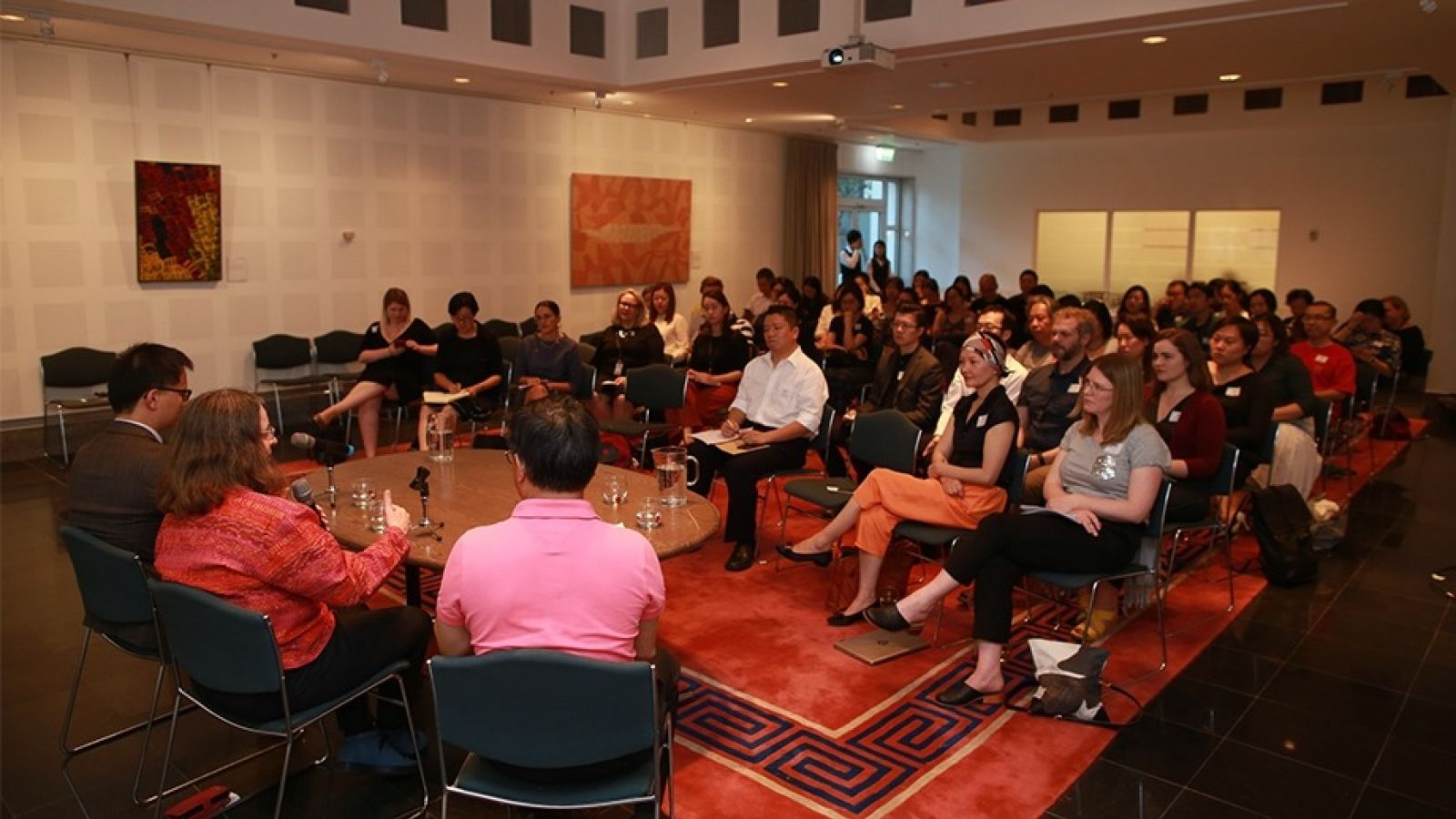ANU scholars lead discussions on heritage management in Beijing

(R to L) Professor Shouyong Pan, Professor of Anthropology and Museum Studies at Minzu University of China; Professor Laurajane Smith, Director of the ANU Centre for Heritage and Museum Studies, and Dr Yujie Zhu, Lecturer in the ANU Centre for Heritage and Museum Studies, speaking to audience. Image: DFAT/Luke Pegrum
Leading scholars from the ANU Centre for Heritage and Museum Studies presented at a sold-out workshop in Beijing on heritage management in Australia and China.
The unique workshop, organised by the ANU China Liaison Office in collaboration with the Australian Embassy in Beijing, also featured experts from the National Museum of Australia (NMA), the National Museum of China (NMC), and Minzu University of China.
In the first roundtable, Centre Director, Professor Laurajane Smith, and academic Dr Yujie Zhu led a discussion about the importance of heritage management and the different cultural understandings of heritage management in the two countries.
“The audience asked about the significance of heritage management and conservation in our different countries, and people’s perspective of heritage and history,” Dr Zhu said.
During that session, Dr Zhu talked about heritage tourism, the subject of his new book Heritage and Romantic Consumption in China, which was launched in the final chapter of the event by the Vice-President of Beijing Foreign Studies University, Professor Sun Youzhong.
“My book is about heritage and romantic consumption, which shows the cultural, economic and social impacts of tourism on Indigenous culture, which is very relevant to not only to China but other countries like Australia.”
Dr Zhu’s overview of his book’s themes prompted questions about the perception of Chinese tourists and how they engage with different cultures and landscapes.
He added: “The attendees were also interested in how we engage with Indigenous culture and material culture.”
That subject was dealt with in the second roundtable, which focused on Indigenous Australian material culture. Representatives from the two national museums discussed the exhibition Old Masters: Australia’s Great Bark Artists, in which over 150 artworks and objects from the NMA’s collection were exhibited at the NMC from July to just before the Beijing workshop.
“People asked how China engages with their cultural heritage and how they interpreted the meanings of the paintings,” Dr Zhu said.
He said that the challenges and opportunities for heritage management in China, where the field is burgeoning, are different from those in Australia, where it’s more developed.
“In Australia heritage management is well established and significant numbers of professionals work in this area” he said. “While China is learning about the policies, principles, and western conservation values and practices, and they are trying to integrate these ideas and values into their own practices.”
The strong interest in the workshop, which was attended by prospective students and ANU museum and heritage studies alumni as well as local practitioners in the field, is reflective of the increasing numbers of Chinese students enrolled in the ANU Master of Museum and Heritage Studies.
“There’s a huge demand in China to train professionals and opportunities for work in this area when they graduate. That’s why there’s a lot of educational programs developing in China, but also a demand for overseas training on this topic,” Dr Zhu said.
He talked about the student interest in learning about Australian and Chinese heritage going both ways.
“China is a huge country with an interesting culture that a lot of Australian and international students would like to see,” Dr Zhu said. “That’s why we have developed a field school (Culture and Heritage in China) and China internships that give them that opportunity.”
“So it’s not just about attracting Chinese students to come here to Australia, but Australian and international students to go to China to learn about the culture of that country.”
Below: A video featuring Professor Laurajane Smith and Dr Yujie Zhu at the event, by the Australian Embassy in China.